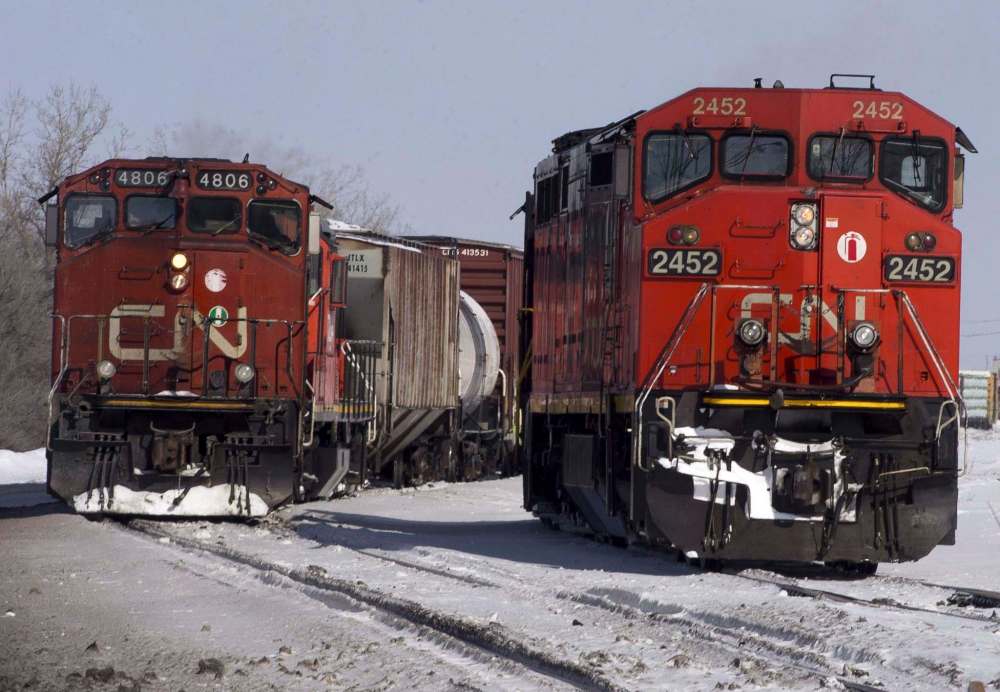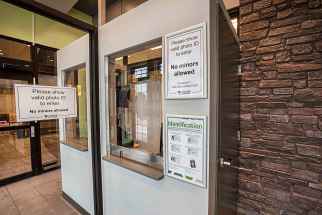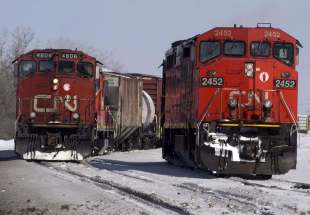Tentative deal gives CN workers power over rest breaks
Read this article for free:
or
Already have an account? Log in here »
To continue reading, please subscribe:
Monthly Digital Subscription
$0 for the first 4 weeks*
- Enjoy unlimited reading on winnipegfreepress.com
- Read the E-Edition, our digital replica newspaper
- Access News Break, our award-winning app
- Play interactive puzzles
*No charge for 4 weeks then price increases to the regular rate of $19.00 plus GST every four weeks. Offer available to new and qualified returning subscribers only. Cancel any time.
Monthly Digital Subscription
$4.75/week*
- Enjoy unlimited reading on winnipegfreepress.com
- Read the E-Edition, our digital replica newspaper
- Access News Break, our award-winning app
- Play interactive puzzles
*Billed as $19 plus GST every four weeks. Cancel any time.
To continue reading, please subscribe:
Add Free Press access to your Brandon Sun subscription for only an additional
$1 for the first 4 weeks*
*Your next subscription payment will increase by $1.00 and you will be charged $16.99 plus GST for four weeks. After four weeks, your payment will increase to $23.99 plus GST every four weeks.
Read unlimited articles for free today:
or
Already have an account? Log in here »
Hey there, time traveller!
This article was published 27/11/2019 (2203 days ago), so information in it may no longer be current.
OTTAWA — Overtired train workers would not be compelled to work past the start of their rest breaks as part of a tentative agreement in the CN Rail strike, according to a draft copy the deal obtained by the Free Press.
“I will advise all company officers that we shall waive the work-now-grieve-later principle if an employee seeks to book rest, where the employee is fatigued on the job and seeks to be relieved,” reads a Tuesday letter signed by CN’s labour-relations director, Joe Torchia.
The change comes amid a historic amount of oil crossing the Prairies by rail, and after documents revealed CN workers in Manitoba have been crammed into over-capacity bunkhouses and short-changed on sleep periods.
The CN letter is an appendix to the proposed terms that Teamsters members will vote on ratifying in the coming weeks.

Those draft terms call for pay raises of 2.5 per cent to hourly, mileage and flat rates of pay as of July 23, 2019, retroactive to that date. It prescribes an identical wage rise a year later, and a three per cent increase in 2021.
The agreement largely focuses on fatigue and safety issues. None of the signatories provided the document to this newspaper.
The eight-day strike prompted a propane shortage among Quebec hospitals, and a push by the Alberta government and farming groups for back-to-work legislation, which the federal Liberals resisted.
Safety was among the Teamsters’ key issues, with the union releasing a year-old recording in which a CN supervisor claimed “rest is not a regulatory or safety issue.”
That recording stemmed from an argument in which an Ontario train staff member asked for Transport Canada to confirm whether CN was breaching safety rules by asking him to move a train while he was reporting unfit for duty and claiming he was beyond the agreed work hours.
The union said CN suspended that employee for two weeks without pay for not moving the train.
In addition to CN pledging Tuesday to hear out such complaints in the future, the firm will also pay half the cost of work boots twice a year. Those familiar with the negotiations say this is an effort to encourage employees to don proper safety equipment.
The agreement sets out shifts as starting and ending at the employee’s locker facility, or another agreed location, in order to clarify how to tabulate when workers at CN terminals are on paid time. Previously, employees had cited disputes over what counts as showing up on time for a shift.
Workers will also be compensated when scheduled to work 30 and 60 minutes into their rest periods, including train staff and those at railyards.
Transport Canada and CN Rail are still working out the railway’s work-rest rules, which has been a points of tension between the two.

In July, Transport Minister Marc Garneau wrote to CN and CP Rail that he was “very disappointed” by their “deficient” work-rule proposals, saying each “fails to treat fatigue as an issue that impacts all people equally.”
Ottawa gives railways guidelines to set their own safety rules, but generally puts them in charge of setting specifics in order to manage their supply chain and staffing.
In December 2018, Transport Canada tasked both railways with updating rules that "do not reflect present-day fatigue science” and contribute to “the risk for occupational injuries and incidents.”
Those included counting an employee’s travel time to and from work as part of their rest period in order to not short-change their sleep, and limited the variability of when a worker’s shift starts, so that their body clock allows them to actually sleep.
“I will advise all company officers that we shall waive the work-now-grieve-later principle if an employee seeks to book rest, where the employee is fatigued on the job and seeks to be relieved.” – Letter signed by CN’s labour-relations director, Joe Torchia
Garneau reiterated Tuesday that the rules review “is a priority for the government” which is “actively working” with the unions and companies involved; he started consultations on the issue in November 2017.
In October 2018, the head of the Transportation Safety Board chastised railways for “standing behind collective agreements to justify schedules that really are conducive to fatigue.”
The arm’s-length watchdog has listed rail-worker fatigue as one of Canada’s top safety risks since October 2016.
A year ago, the Free Press revealed workers driving trains through Manitoba were often exhausted due to supervisors counting 90-minute trips to hotels as part of employees’ sleep periods, a fear of retaliation for calling in unfit to work and employees sleeping on couches and floors at the company’s Rivers, Man., bunkhouse.
dylan.robertson@freepress.mb.ca
wfppdf:https://wfpquantum.s3.amazonaws.com/pdf/2019/13765_CN-Rail-Teamsters-collective-agreement-fatigue-excerpt.pdf|Fatigue excerpt from CN Rail and Teamsters' draft collective agreement:wfppdfHistory
Updated on Wednesday, November 27, 2019 7:35 PM CST: Fixes spelling of name.










